‘Disease’ that traps its victims in terror
Tribune hosts summit, asking: How can we finally stop epidemic of violence against women?
Friday, 29th April 2022 — By Anna Lamche
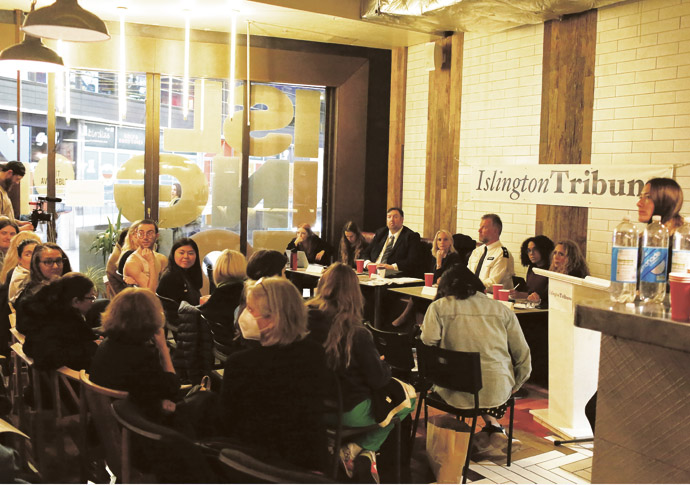
VAWG meeting hosted by the Tribune at the Angel Central shopping centre
ANGER, pain and resolve erupted on Tuesday night as the community gathered to form a “charter” of steps that can be taken to tackle violence against women and girls (VAWG) in Islington over the coming year.
At an urgent summit in Angel Central shopping centre, survivors of gendered violence shared their stories with courage and clarity and our panel – a range of local politicians, police, experts and activists – offered their perspective on the next “actionable” steps Islington can take to combat the endemic violence faced by so many women in the borough.
The meeting, which lasted for more than two hours, finished with a clear programme of action, and, in the words of Islington’s Mayor, the resolution to “come back in a year’s time and see how far we’ve come”.
The meeting heard that changes to education, culture and policing are vital if we are to see any improvement in women’s safety. Islington’s Young Mayor, Rosie Kurnaz, described male violence as a “disease”, and this metaphor is instructive: rather than treating the symptoms of the illness, the consensus ran, preventative action on VAWG is essential.
We were joined by the leader of the council, Cllr Kaya Comer-Schwartz, along with Andy Carter, the most senior police officer in the borough, and Troy Gallagher, Islington’s Mayor.
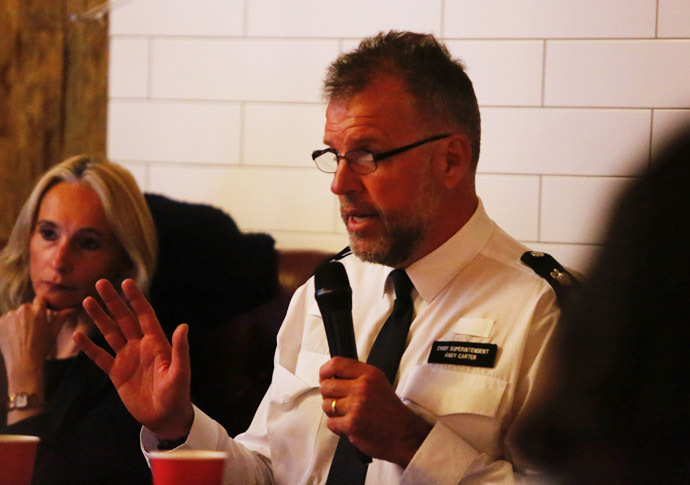
Chief Superintendent Andy Carter
Our other speakers included Patsy Stevenson, the women’s rights activist, Alison Bird of Solace Women’s Aid, and Halaheh Taheri of MEWSo. We also heard from Sarah Michael, a survivor of domestic abuse.
Ms Michael, who kicked off the discussion by sharing her story, underscored the long-lasting impact of domestic violence on the children who witness it, and the insidious way patterns of violence are passed from one generation to the next.
Having been exposed to domestic abuse as a child – she described seeing her mother “covered in blood, with broken bones” – Ms Michael said she went on to experience the same violence as an adult.
“I met my perpetrator and I didn’t realise until it was too late,” she said. “I think it was my trauma from my early childhood playing out in my adult life, and I was trapped.”
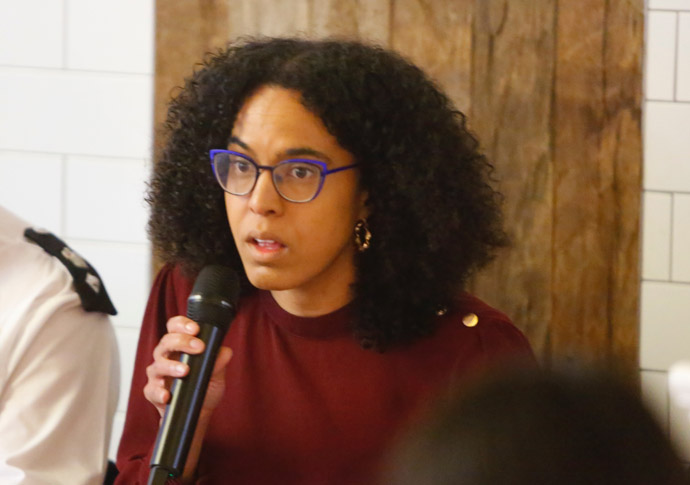
Leader of the council, Cllr Kaya Comer-Schwartz
Ms Michael’s story was the first of many to be shared on the night. Other women told of men consistently breaching restraining orders; of ex-partners causing trouble long after an abusive relationship has come to an end; of murder threats and ineffectual police involvement.
“A lot of women in domestic violence relationships are the strongest, most empathetic, most powerful, unbelievable women,” one survivor said.
“We have huge empathy – and that’s part of the problem, because you empathise with [men] who have experienced violence in their childhood. You want to save them,” she added.
Cllr Comer-Schwartz said: “I come from a family which is dominated by women, and very proudly so.
“But I’m only one of two women in that big family that hasn’t had direct experience of domestic violence. That is how prevalent it is.”
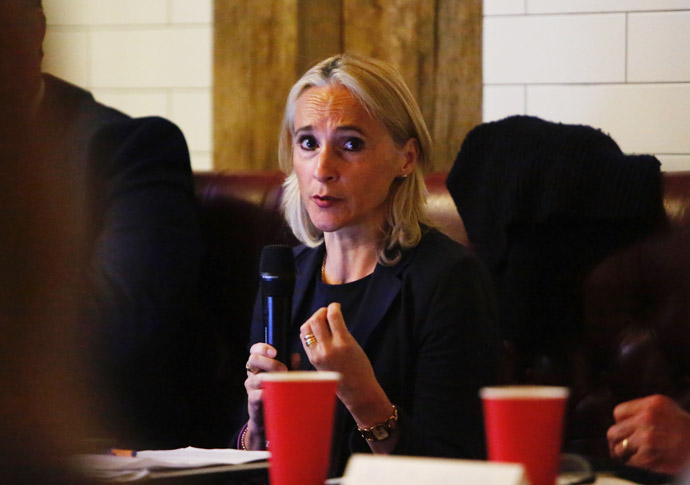
Alison Bird of Solace Women’s Aid
She said the council’s focus will remain on “perpetrator accountability”, pledging to “go further” on “perpetrator work” and “have a campaign that’s about healing, but also about accountability”.
Chief Superintendent Carter said: “More recently, and locally, I’ve launched a campaign: Enough is Enough.
“And that’s a very simple, direct message to my staff, that we will not tolerate inappropriate and unprofessional behaviour any longer, drawing the line until it is not acceptable. I don’t think it’s an irretrievable situation.
“In fact, we mustn’t think that – my officers are there every single day and they will do the right thing to protect you.
“And that’s what we’re committed to make sure happens.”
Ms Bird said: “I do think it’s going to take time to rebuild trust with police. What I would like to see is a really stringent and robust disciplinary process for any gateway behaviours, whether it’s domestic abuse, coercive control, or sexual harassment.”
She also said police must take breaches of bail and non-molestation orders seriously, adding: “I want to see a proactive investigation around breaches.”
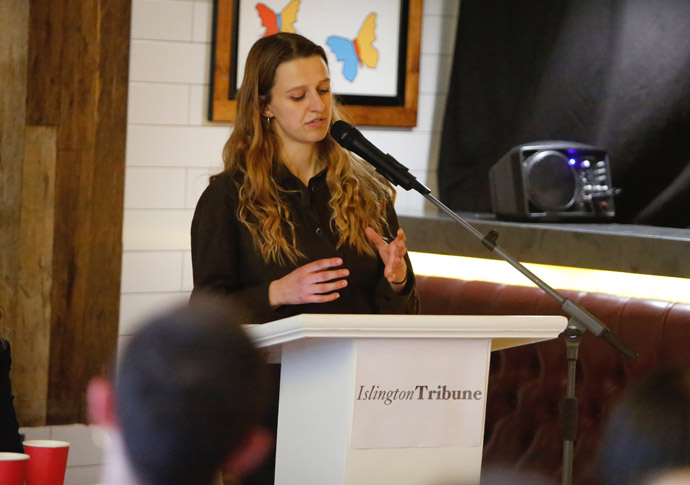
Islington Tribune reporter Anna Lamche
This special summit on VAWG was organised in response to the tragic death of Sabita Thanwani, the 19-year-old City University student who was found dead in her Clerkenwell halls of residence last month.
At the time, the national press descended onto the campus of City University for a weekend – and then, in thrall to the edicts of the weekly news cycle, promptly disappeared without trace.
The Tribune has pledged to set itself apart from this model, which only leaves space for reporting on gendered violence in the aftermath of a fatal tragedy. Hence Tuesday’s summit.
Our aim was to move beyond identifying the problem, to develop a charter of “concrete actions” that could be implemented in Islington to tackle VAWG over both the short and longer term.
The charter, printed in these pages, left, is by no means an exhaustive list of all the measures suggested in the meeting.
Instead we have attempted to distil the discussion into 10 clear, actionable points, and we intend to check back regularly to see how we are getting on.
In a special edition of the Tribune, the debate continues with a four-page supplement with views from teachers, politicians and activists over what is happening and, crucially, what should happen next.
• The Tribune would like to thank Angel Central and manager Adam Cummins for helping us to host this important event, the Wagamama restaurant and Joe Henry from AV2 Hire.
Patsy: ‘I lost trust – sexism in the police is institutionalised’
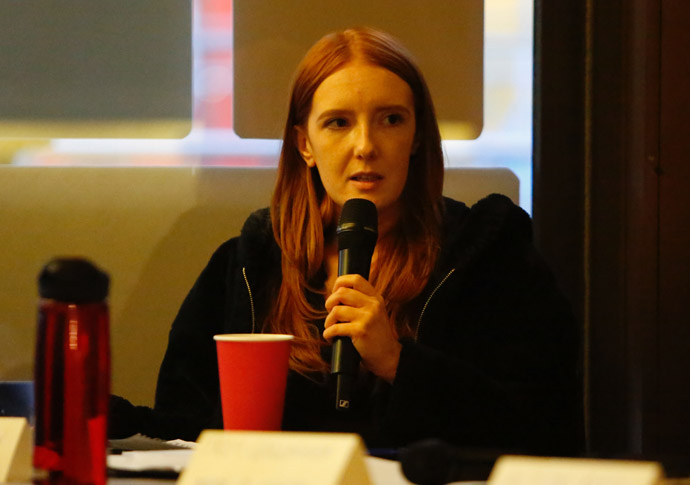
SINCE her arrest at the vigil for Sarah Everard last year, Patsy Stevenson has been campaigning for radical reform in the Met Police, writes Isabelle Stanley.
Speaking on Tuesday, she said that measures like increasing the number of female officers, or empathy training are insufficient to tackle systemic sexism.
Ms Stevenson (above) said: “After what I saw at the vigil, I have no trust in the police.
“With the things I’ve experienced, hiring women in the police isn’t going to do anything – it seems like it will, but it doesn’t fix the problem. The sexism is so institutionalised and ingrained, it needs radical reformation.
“There are officers that are trying to do good, but if you are perpetuating things that are going on and ignoring the issues you are just allowing things to go on and nothing will change.”
Ms Stevenson suggested that the police should be working with activists, adding: “Have the police ever thought about coming out with us? I’m sure there are activists in this community – there needs to be meetings with diverse and intersectional activists and the police.”